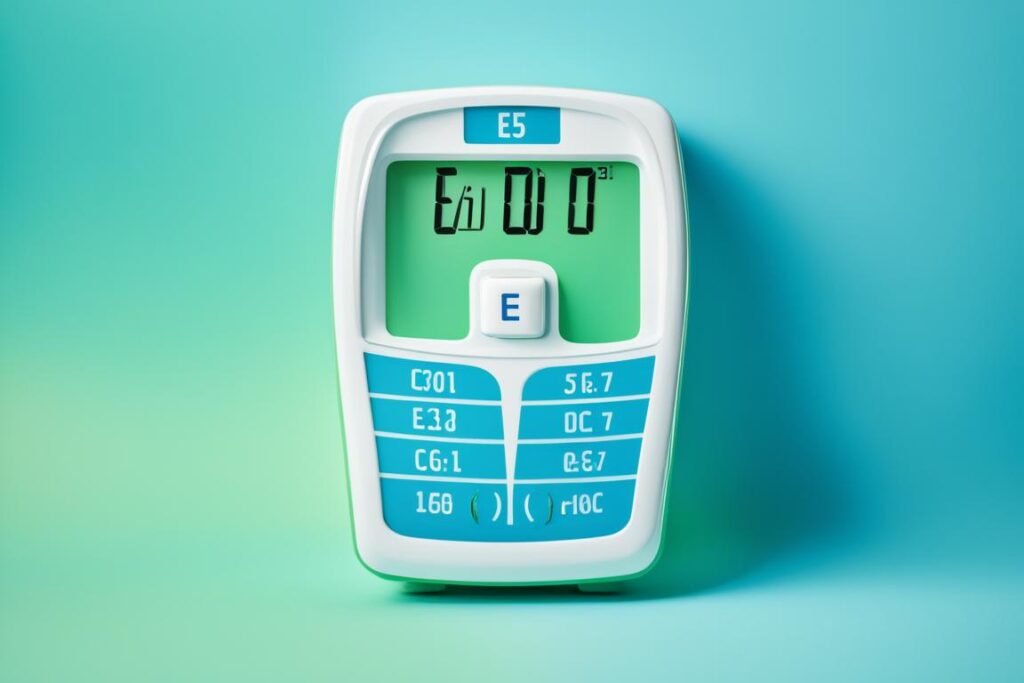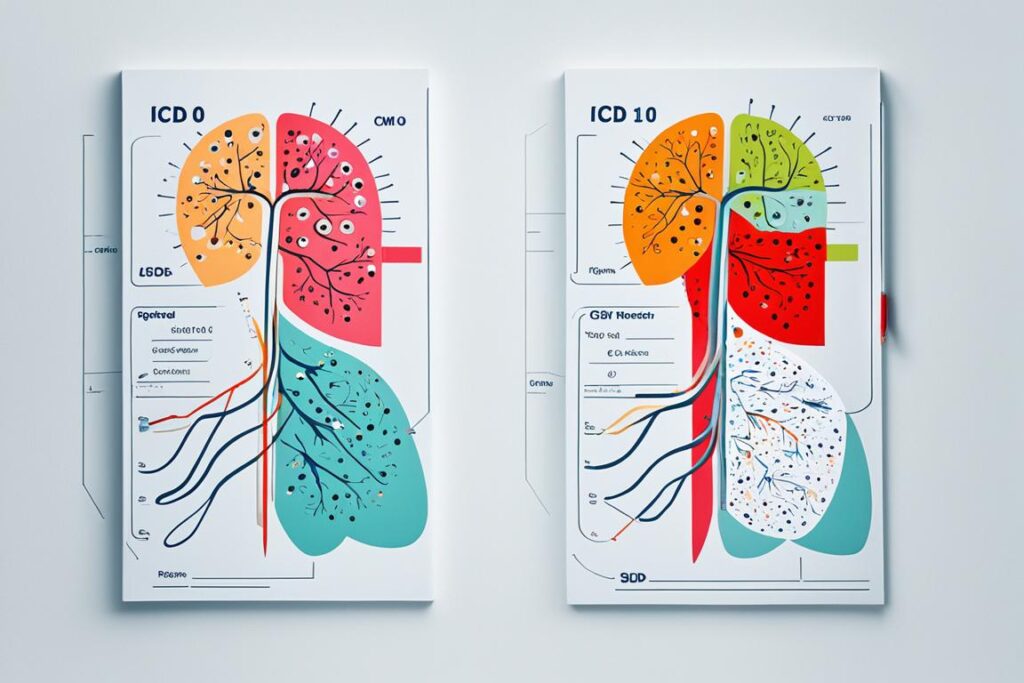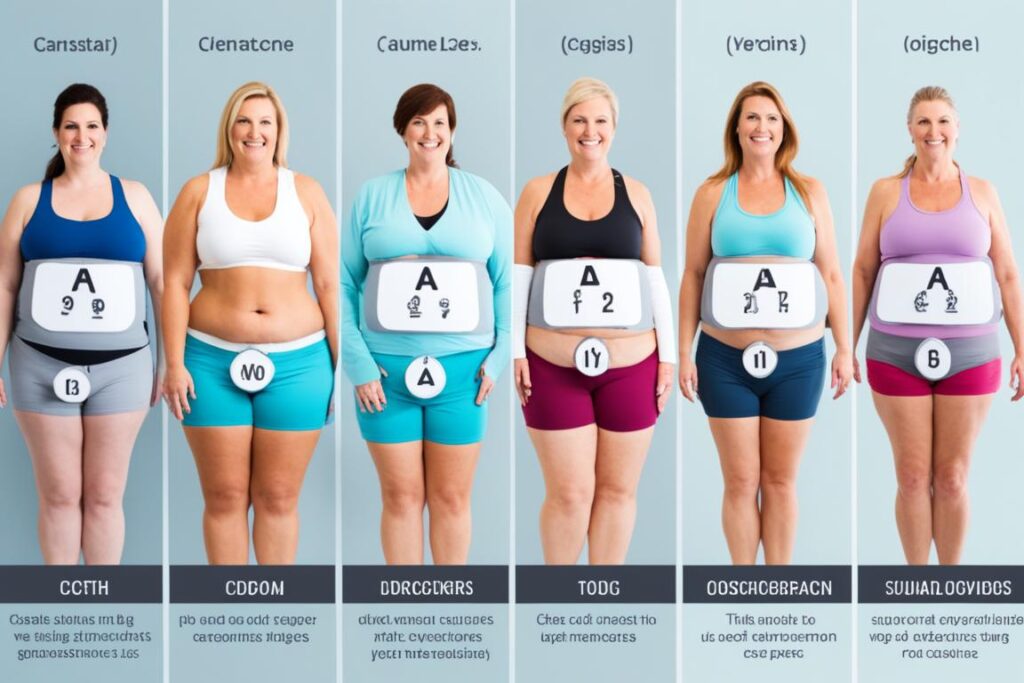Did you know the ICD-10-CM code R63.4 for abnormal weight loss started on October 1, 2023? This code is now part of Diagnostic Related Groups 640 and 641. It’s key for properly diagnosing and managing weight loss issues.
Weight loss, whether it’s planned or not, is a big deal in healthcare. ICD-10-CM codes are vital for doctors. They help standardize diagnoses. Plus, they’re important for the billing process. Knowing the specific code for weight loss, like R63.4, helps with precise billing and record-keeping in the US.
Key Takeaways
- The ICD-10-CM code R63.4 for abnormal weight loss became effective on October 1, 2023.
- ICD-10 codes are critical for accurate diagnosis, billing, and reimbursement.
- Code R63.4 falls under the category of miscellaneous disorders of nutrition, metabolism, fluids, and electrolytes.
- Other related codes indicate exclusions for underweight and cachexia, differentiating these from abnormal weight loss.
- Precise coding is essential for healthcare billing and insurance claims, especially post-October 1, 2015.
Introduction to Weight Loss ICD-10 Codes
Understanding the weight loss ICD-10 codes is crucial for healthcare workers. Especially those who work with weight management and nutrition advice. These codes are a standard way to record medical diagnoses and patient visit reasons.
The ICD-10-CM Official Guidelines for 2024 provide rules for using these codes. They are approved by groups like the AHA and CMS. These guidelines help in various health services.
Following these guidelines ensures correct coding for weight loss. This is key for proper billing and getting paid. Without these codes, we would face many problems in keeping accurate patient records.
ICD-10-CM coding affects how medical bills are created. For instance, dietitians need to use the right weight loss codes. This ensures they get paid correctly for their services.
ICD-10-CM codes come with detailed instructions. For example, Section I talks about the basic rules and code structure. Later sections give guidance for different medical settings. This ensures everyone uses the codes the same way.
Since switching to ICD-10 in 2015, knowing these codes has been very important. It’s not just about picking a code. It’s about understanding the patient’s condition fully.
Correct coding affects the quality of patient care greatly. It helps in getting the right payment and taking care of the patient’s health properly. Every detail of their health is recorded and looked after.
This guide helps you learn about weight loss ICD-10 codes. Knowing these codes makes billing precise and improves patient care. It helps both healthcare workers and their patients.
What Are ICD-10 Codes?

ICD-10 codes are recognized globally and made by the World Health Organization (WHO). They classify and diagnose health issues. These codes are key in healthcare for accurate medical data, crucial for billing and insurance. It’s important for healthcare providers and patients to know about ICD-10 criteria for weight loss.
Purpose and Importance
ICD-10 codes have several important roles in healthcare:
- Clinical Documentation: They offer a detailed system helping healthcare pros document patient conditions well.
- Medical Billing and Insurance Claims: These codes make billing smoother and ensure accurate communication for insurance.
- Research and Clinical Studies: They improve the data available for research, helping advance medical science and treatments.
- Public Health Tracking: They track disease prevalence, aiding public health policy formulation both nationally and internationally.
How ICD-10 Codes Are Utilized
ICD-10 codes are used in different healthcare areas:
- Medical Records: They keep patient records precise and thorough.
- Communication: They enable clear communication among healthcare providers with a standardized language.
- Insurance: Proper coding is vital for correct insurance claims. For example, the ICD 10 code for weight loss details the reason for weight loss, ensuring accurate repayment.
- Quality Assessment: The codes help evaluate care quality, leading to better healthcare services.
Effective use of ICD-10 codes helps healthcare providers keep accurate records. It ensures they get the right reimbursements. Plus, it contributes to public health data, aiding in research and policy making.
Categories of ICD-10 Codes Relevant to Weight Loss
In the ICD-10 coding system, there are specific categories for weight loss. They cover symptoms and signs related to eating and drinking, and health status factors. These categories help with correct diagnosis and billing, following the icd 10 guidelines for weight loss.
Symptoms and Signs Concerning Food and Fluid Intake
Code R63.5 in the ICD-10-CM marks abnormal weight gain, starting October 1, 2023. It doesn’t apply to weight gain in pregnancy (O26.0) or obesity (E66). Codes from R00 to R99 list symptoms and abnormal findings that don’t fit elsewhere. R63 codes deal with weight issues, like not gaining weight or gaining too much.
Codes also cover anorexia (R63.0), intense thirst (R63.1), extreme hunger (R63.2), feeding problems (R63.3), and being underweight (R63.6). These codes give detailed views on food and drink issues, aiding in thorough documentation and weight loss coding tips.
Factors Influencing Health Status
Codes about health status offer a broad look at patient health’s effect on weight. Code Z71.3, for diet advice and watching, is key for weight loss plans. Also, starting October 1, 2023, code R64 will cover cachexia, the severe weight loss seen in chronic illnesses. These codes help accurately record and analyze health impacts, keeping in line with icd 10 guidelines for weight loss.
Below are some important ICD-10 codes for weight loss and gain:
| ICD-10 Code | Description | Excludes |
|---|---|---|
| R63.4 | Abnormal Weight Loss | Cachexia, Others |
| R63.5 | Abnormal Weight Gain | Excessive weight gain in pregnancy (O26.0), Obesity (E66) |
| Z71.3 | Dietary Counseling and Surveillance | |
| R64 | Cachexia | Malnutrition (E43), Nutritional Marasmus (E41) |
Overview of ICD-10 Code R63.4 for Abnormal Weight Loss
ICD-10 code R63.4 is classified under symptoms, signs, and other findings not listed elsewhere. It mainly deals with issues related to food and fluid intake. It’s key for noting abnormal weight loss, whether intentional or due to illness. Correct use of the ICD-10 code is critical.
This code includes much additional info like APC Status Indicator and Assistant Surgeon details. These bits of information are crucial for coding and billing. They help ensure documents are complete and payments are accurate.
You can find the R63.4 code and its features through subscriptions such as Find-A-Code Professional and others. These services help improve your coding with documentation and tips. They also offer mappings between ICD-9 and ICD-10.
Users can also add personal notes and see Admin Notes. This is great for teamwork in tricky weight loss cases. It helps with sharing knowledge among healthcare workers.
Another code, ICD-10-CM Diagnosis Code R63.5, is for abnormal weight gain. It will be for billing from October 1, 2023. This shows the American version of ICD-10-CM R63.5 is different from the international one, highlighting the need for accurate coding.
| Code | Description | Effective Date | Usage |
|---|---|---|---|
| R63.4 | Abnormal weight loss | Current | Documenting weight loss conditions, accurate billing |
| R63.5 | Abnormal weight gain | October 1, 2023 | Used for reimbursement purposes |
| E66 | Obesity | Current | Classifying various obesity-related conditions |
ICD-10 code R63.4 is crucial for professionals dealing with weight loss issues. Using it in medical records makes diagnosis and billing smoother. This enhances care for patients and efficiency in managing weight reduction codes.
ICD-10 Code Z71.3 for Dietary Counseling and Surveillance

ICD-10 Code Z71.3 is crucial for healthcare providers. It’s mainly used for dietary counseling and surveillance. It helps professionals like nutritional experts and dietitians. They use it to justify why weight management services and other dietary advice are needed.
This covers guidance for managing obesity, diabetes, and high blood pressure. Dietitians do not diagnose but must use precise ICD-10 codes. Codes like Z71.3 are key to backing up their treatment plans. This code makes sure healthcare providers and insurers clearly understand the reason for dietary guidance.
Using the ICD-10 Code Z71.3 makes billing smoother for dietitians. It lets them bill for nutrition services easily. This code is key in weight loss documentation. It highlights the need for ongoing dietary advice.
| ICD-10 Code | Condition/Use |
|---|---|
| Z68.1 – Z68.45 | BMI codes for adults (21+ years) |
| Z68.51 – Z68.54 | BMI codes for pediatric patients (2-20 years) |
| Z71.3 | Dietary Counseling and Surveillance |
| Z59.41 | Food Insecurity counseling |
| Z68.30 | BMI 30.0-30.9 in adults |
Using Z71.3 for dietary counseling is vital for accurate records of patient needs. It helps make dietary interventions and management plans more effective. Consistent use of these codes is important for good patient care and smooth billing processes.
Using ICD-10 Codes for Accurate Medical Billing
Accurate medical billing is key and it all rests on using ICD-10 codes right. For healthcare providers, this means getting paid on time and the right amount for weight loss procedures. They need to keep up with billing rule changes and know why weight loss documentation requirements matter.
Importance of Precise Coding
Choosing the right ICD-10 codes is vital for accurate billing. For example, using R63.4 for unintended weight loss and E46 for malnutrition shows the need for treatments. Providers must keep current on these codes to avoid having claims denied. Right use of BMI codes and others is crucial for patient check-ups, insurance, and tracking health.
Codes for adult BMI range from Z68.1 to Z68.45. Kids’ BMI codes go from Z68.51 to Z68.54. Updating code knowledge keeps you compliant and your finances safe.
Common Errors to Avoid
Making sure you don’t use old codes or mess up the details is super important. Mistakes can get claims kicked back or delay your money. Using smart tools like TextExpander can make coding more accurate and fast. Let’s look at some mistakes and what they can cause:
| Common Errors | Impacts |
|---|---|
| Using outdated ICD-10 codes | Claim rejections and denials |
| Incorrect code specificity | Inability to justify medical necessity |
| Not updating with new effective dates | Non-compliance with billing regulations |
Improve your billing by using these weight loss coding tips. Check out helpful resources and attend training. Being proactive smooths out billing and helps your bottom line.
ICD-10 and ICD-10-CM: What’s the Difference?

The ICD-10 is an international coding system made by the World Health Organization (WHO). It classifies health conditions globally. The ICD-10-CM, or Clinical Modification, is its U.S. version, made by the CDC. It adds more detail for use in the U.S. healthcare system.
Knowing the difference between these systems is key for right medical billing and claims processing.
The ICD-10-CM has codes like E66 for overweight and obesity issues. This helps with weight loss diagnoses. One code, E66.9 for “obesity, unspecified,” started on October 1, 2023. But, this code usually can’t be the main reason for hospital stays.
A comparison between ICD-10 and ICD-10-CM shows:
| Aspect | ICD-10 | ICD-10-CM |
|---|---|---|
| Developed By | WHO | CDC |
| Scope | International | United States |
| Code Quantity | 14,400 | 68,000+ |
| Detail Level | General | Detailed Clinical Information |
ICD-10-CM’s detail helps doctors diagnose accurately. This ensures the right treatment and weight loss management. Using correct ICD-10-CM codes, like E66.9, leads to better treatment and easier billing. Knowing the differences between ICD-10 and ICD-10-CM, including weight loss codes, is crucial.
Weight Loss Documentation Requirements for ICD-10

Following weight loss documentation rules is key when coding for weight loss. Medical records must show why services are needed. They should use ICD-10 codes that match patient diagnoses. It’s also vital to stay up-to-date with coding editions and know the rules that affect coding.
Navigating Documentation Guidelines
Healthcare providers must carefully document weight loss codes. This supports the diagnoses and treatments. Details include:
- Documenting BMI: BMI needs to be accurate for each patient visit. It’s important to note if it’s for adults aged 20 and older or kids between 2 and 19.
- Observing Weight Loss Thresholds: Follow the rules for defining severe malnutrition. These rules include losing more than 2% of body weight in a week, more than 5% in a month, or more than 7.5% in three months.
- Meeting GLIM Criteria: Use the GLIM criteria. This means noting weight loss of 5% in less than six months or 10% over six months, and specific BMI levels for people under and over 70.
Ensuring Compliance with Regulations
Keeping documents consistent across providers is a must. Consistency covers:
- Comprehensive Treatment Plans: Match treatment plans to malnutrition severity, according to OIG guidelines.
- Accurate Coding: Use the latest ICD-10 codes for correct billing. This helps avoid audits and overpayments.
- Documentation of Coexisting Conditions: Mention any other conditions like heart disease or diabetes. They pose greater risks for obese individuals.
Good documentation helps ensure patient care is effective and funded right. This lets patients get the treatments they need for better health.
| Criteria | Documentation Requirement | Example |
|---|---|---|
| BMI Calculation | Record BMI at each visit | BMI: 32 |
| Weight Loss Thresholds | Track weight loss over specific periods | >5% in one month |
| GLIM Criteria | Monitor BMI and weight loss | BMI: |
Weight Loss ICD-10 Code R63.4 and Related Codes
The ICD-10 code for weight loss, known as R63.4, is key for proper medical coding. It describes abnormal weight loss accurately. Starting from October 1, 2023, it’s part of the R00-R99 series. This range includes various symptoms and findings not specified elsewhere.
R63.4 is about abnormal weight loss, while R63.5 targets abnormal weight gain. It’s vital for healthcare workers to know the difference for the right code use. Also, the icd 10 weight reduction code isn’t for use in detailed billing scenarios.
Codes like R63.6 for being underweight and U07.0 for drug-influenced conditions show the system’s scope. The R63.4 chapter has key details like APC Status and Physician Supervisions. Such info boosts this coding system’s value.
These extra categories help in thorough patient documentation. This aids in complete care and smooth insurance processes. After October 1, 2015, using ICD-10-CM codes like R63.4 became a must. This move standardized billing in healthcare, ensuring clarity on conditions like abnormal weight loss.
Knowing the difference between the icd 10 code for weight loss R63.4 and others is crucial. It helps in accurately capturing health situations. This ensures precise records and effective insurance billing.
Best Practices for Implementing ICD-10 Coding for Weight Loss
To effectively use weight loss ICD-10 codes, following best coding practices is crucial. This ensures accuracy and compliance. It’s important to stay current with the latest guidelines. The ICD-10-CM coding and reporting updates for FY 2024 are in effect from April 1, 2024, to September 30, 2024. These updates include important changes from the American Hospital Association, CMS, and NCHS.
Having accurate and complete documentation is key to successful coding. The guidelines are divided into general and specific diagnosis settings. They stress documenting all patient condition details. For example, obesity (ICD-10 code E66) and BMI codes show a full view of the patient’s health. This ensures the medical need for diet interventions is clear.
Coders and healthcare providers working together is another important coding practice. This team effort is essential for correct code use and HIPAA reporting. Good communication makes sure codes truly reflect the patient’s health and treatment. This improves care and billing accuracy.
Knowing CPT codes for dietitians, like 97802, 97803, and 97804, helps with coding. Using these and weight loss ICD-10 codes correctly is important. For instance, Z71.3 is for preventive dietary counseling. Correct code use ensures services are billed right to insurance.
Avoiding common coding mistakes is crucial too. Wrong codes can cause billing problems and compliance issues. Making sure every code matches the medical records and shows the patient’s true health status is essential. This keeps medical records accurate and billing compliant.
Managing Multiple ICD-10 Codes in Patient Records
When talking about weight loss in patient records, using many ICD-10 codes is key. Codes like E66 point out obesity, and BMI codes like Z68 add more detail. This careful use of codes is crucial to correctly show a patient’s health issues and help with insurance claims.
Doctors often deal with situations needing them to use various ICD-10 codes. For instance, starting October 1, 2023, the code Z71.89 will be used for special counseling needs, like weight loss advice. It’s very important to handle these codes well for full patient care and correct health records.
It’s also important to know about category Z71. This category is for people needing advice or counseling not listed elsewhere. Code Z71.89 doesn’t need to be noted as present when admitted and is linked to health status influences. Using related codes, for things like quitting smoking or exercise advice, can help show a patient’s health needs more fully.
| ICD-10 Code | Description | Effective Date | Associated Counseling Services |
|---|---|---|---|
| Z71.89 | Other Specified Counseling | Oct 1, 2023 | Weight Loss Counseling, Diabetes Educational Counseling, Breast Feeding Counseling, and more |
| Z68 | Body Mass Index [BMI] | 2015 | Specifies BMI Levels |
| E66 | Obesity | 2015 | Various Forms of Obesity Documentation |
| R63.8 | Symptoms and Signs Concerning Food and Fluid Intake | 2015 | Feeding Difficulties, Slow Weight Gain |
Code R63.8, starting in 2024, shows why it’s key to document food and drink issues. Along with other codes, it helps record cases when a clear diagnosis is hard to find.
To manage ICD-10 codes effectively, know the rules and data. For correct medical billing, use the latest ICD-10 guidelines. This makes sure patient records are detailed and right.
Additional Tips for Weight Loss ICD-10 Coding Success
Learning weight loss ICD-10 coding is key. You must stay updated and use educational tools. This makes sure codes are right and rules are followed.
Staying Updated with Coding Changes
ICD-10 codes change often, affecting billing and records. It’s key to keep up with these updates. The American Academy of Pediatrics shows that knowing codes, like the icd 10 code for weight loss, is vital. Chapter 21 of the ICD-10-CM guidelines points out the role of Z codes after a child is born. They can be main or extra codes, showing the need for precise coding.
Resources for Further Learning
Using trusted learning sources is important for your success. Resources from places like the Academy of Nutrition and Dietetics, AAPC, and the CDC’s free ICD-10 code lookup tool are very helpful. They give great tips on weight loss coding.
These resources teach about codes like R63.4 (Abnormal weight loss) and newborn codes P92.2 and P92.5. Using them ensures you’re up to date with ICD-10 coding standards. This boosts your skills and accuracy. You’ll be able to record everything needed about your patients.
Conclusion
For nutrition and dietetics experts, knowing the details of weight loss ICD-10 coding is key. Correct coding means not just right payment, but also better records and care continuity. Following coding rules, keeping up with updates, and detailed recording are crucial for good coding.
The new R68.89 code in the 2024 ICD-10-CM edition is important. Starting October 1, 2023, it covers various symptoms and findings when the exact illness is unknown. Staying updated on ICD-10 changes is vital for precise coding and high-quality patient care.
Tools like the CMS ICD-10 Homepage and the WHO ICD-10 Online Browser help improve coding skills. Adopting these methods will enhance your coding and lead to better patient care. This shows the importance of correct documentation in health services.
FAQ
Q: What is the ICD-10 code for abnormal weight loss?
Q: Why is the ICD-10-CM system important for weight loss coding?
Q: What are common mistakes to avoid in weight loss medical coding?
Q: How do ICD-10 codes contribute to medical billing accuracy?
Q: What is the difference between ICD-10 and ICD-10-CM?
Q: How can healthcare professionals stay updated with ICD-10 coding changes?
Q: What are the documentation requirements for ICD-10 coding concerning weight loss?
Q: What is ICD-10 Code Z71.3 used for?
Q: How should multiple ICD-10 codes be managed in patient records?
Q: What are the key categories of ICD-10 codes relevant to weight loss?
Source Links
- 2024 ICD-10-CM Diagnosis Code R63.4: Abnormal weight loss
- 2024 ICD-10-CM Diagnosis Code Z71.3: Dietary counseling and surveillance
- 2024 ICD-10-CM Diagnosis Code E63.9: Nutritional deficiency, unspecified
- 2023 ICD-10-CM Diagnosis Codes Related to Speech, Language, and Swallowing Disorders
- ICD-10-CM linking – Amazon Comprehend Medical
- 2024 ICD-10-CM Codes E66*: Overweight and obesity
- 2024 ICD-10-CM Diagnosis Code R63.6: Underweight
- ICD-10 Codes for Obesity Causes and Treatment for Obesity – DocCharge
- 2024 ICD-10-CM Diagnosis Code R63.5: Abnormal weight gain
- 2024 ICD-10-CM Diagnosis Code R63.0: Anorexia
- 2024 ICD-10-CM Diagnosis Code R64: Cachexia
- R63.4 Abnormal weight loss – ICD-10-CM Diagnosis Codes
- What Diagnosis Codes Can Dietitians Use to Seek Reimbursement?
- Nutrition Counseling ICD-10 Codes for Dietitians
- Nutrition Diagnosis ICD-10 codes
- ICD 10 Code for Weight Loss: Importance & Best Practices
- BMI ICD 10 Codes
- 2024 ICD-10-CM Diagnosis Code E66.9: Obesity, unspecified
- Understanding the ICD-10 Codes For Obesity
- No title found
- Q&A: Documentation and ICD-10-CM coding for severe malnutrition
- Billing and Coding: Bariatric Surgery Coverage (A53026)
- Symptoms and signs concerning food and fluid intake
- The Dietitian’s Ultimate Guide to ICD-10 Codes – Practice Better
- ICD-10 Coding Scenarios for Family Practice
- 2024 ICD-10-CM Diagnosis Code Z71.89: Other specified counseling
- Other symptoms and signs concerning food and fluid intake
- Hierarchical Condition Category Coding
- Z Codes Key to Code Newborn Low Weight, Weight Loss : ICD-10 Coding
- Coding Diagnoses on Outpatient Encounters
- ICD-10-CM Common Errors and How to Avoid Them – Proactive LTC Consulting
- Other general symptoms and signs
- ICD-10 F32.A
- Validation of obesity-related diagnosis codes in claims data